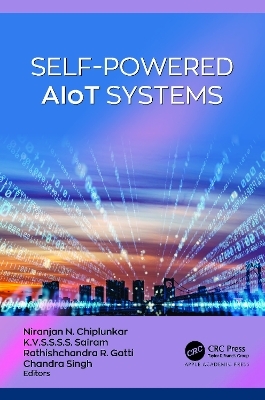
Self-Powered AIoT Systems
Apple Academic Press Inc. (Verlag)
978-1-77491-524-0 (ISBN)
This new volume focuses on design principles for building self-powered AIoT (artificial intelligence of things) applications and their subsequent deployment. The book introduces the futuristic concepts of AIoT by incorporating self-powered systems, firstly by informing the reader of current AI/ML techniques and IoT technologies and then showing the path towards convergence of AI/IoT towards AIoT. The book also explains the many possible diverse applications of AIoT.
The combination of IoT for sensing and aggregation of data from the surroundings and AI for analysis and decision-making will expand cyber-physical intelligence towards achieving complete autonomy. However, as the deployment of sensors becomes increasingly ubiquitous, there will be a massive amount of sensor data aggregation and analyses for autonomous decision-making capabilities of AIoT products. This calls for substantial research and product development in self-powered technologies such as energy harvesters, supercapacitors, energy storage devices for energy generation, and energy-efficient technologies such as ultra-low power (ULP) microcontrollers, ULP microprocessors, and ULP smart sensors and actuators. This volume helps to fill that gap.
The volume presents research and product development towards structured convergence of self-powered systems, leading to pragmatic R&D deliverables for new products and services. The book is the first of its kind on reporting how the current AI and IoT are progressing toward the vision of AIoT. It goes one step further by integrating AIoT with self-powered systems to make them fully autonomous. Convergence will happen as the data volume increases, which is why the IT giants are betting on AIoT. This volume explores the hidden compatibility of self-powered AIoT.
Niranjan N. Chiplunkar, PhD, is Principal of the NMAM Institute of Technology, Nitte, India. During his more than three decades of teaching experience, he was formerly Head of Computer Science and Engineering and Vice Principal of the Institute as well as Dean of Academics. He also served as a lecturer and as a reader in the Department of Computer Science & Engineering at Manipal Institute of Technology, India. He has authored one textbook and several other books and has edited two conference proceedings. He has received several prestigious awards and presented and published more than 50 technical papers in national and international conferences and journals. K.V.S.S.S.S. Sairam, PhD, is Professor and Head of the Electronics & Communication Engineering Department and also an IEEE student branch counselor at the NMAM Institute of Technology, Nitte, India. He has over 23 years of experience in teaching and research. He has published and presented over 50 papers in international and national journals, conferences, and workshops. He has also authored three books. He is a reviewer for several journals, as well as an editorial board member. He has received several awards for his work and has organized many conferences and events, including guest lectures, seminar talks, workshops, exchange programs, etc. Rathishchandra R. Gatti, PhD, is a researcher in the field of self-powered systems, peristaltic robotics, programmable matter and quantum-controlled bots. He is Professor & Head of the Department of Mechanical Engineering and Robotics at Sahyadri College of Engineering & Management, Adyar, India. He was formerly Research Academic and IP Analyst at Curtin University, Australia, and NPI Program Manager at General Electric. He has also held design engineering roles at Meritor Automotive, SVI, and Rapsri. He holds four international patents, has over 17 publications to his credit, and is a reviewer for several journals. Chandra Singh is Assistant Professor at Sahyadri College of Engineering & Management, Adyar, Mangalore, Karnataka, India. He is now pursuing a PhD in Optical Communication at VTU. Mr. Singh has published a book, several book chapters, and more than 15 research articles in reputed peer-reviewed national and international journals. He has also presented papers in national and international conferences, seminars, workshops, and holds several international patents.
1. Smart Sensor Systems 2. Application of Self-Powered Sensors and Actuators in Engineering and Medical Domains 3. Smart Health Care: From IoT to AioT 4. Single-Bit Cache Memory Design for AioT 5. A Survey on the Scope of IoT Using Wireless Sensor Network 6. Future Trends for Smart Parking System with IoT Using Sensor Network 7. A Study on Artificial Neural Network Using IoT 8. Energy Harvesting Forms in Self-Powered Sensors and Energy Harvesting Solutions for IoT Devices 9. Design Considerations for Portable Health Care Monitoring System Using IoT 10. Trends in Distributed Computing 11. AI-Based ULP Microprocessors and Microcontrollers 12. Integration of Sensors and Secure Exchange of Information to Improve Surrounding Estimation in Automated Electric Vehicles 13. A Survey on Shelter Surveillance System – S3 14. Alternative Solution for Speed Breakers on the Road by Automatic Speed Control of Vehicle 15. Web and Server Attacks: Research and Analysis 16. Lidar-Based Gait Study on the Elderly Population in Safe Walking
| Erscheint lt. Verlag | 26.7.2024 |
|---|---|
| Zusatzinfo | 8 Tables, black and white; 193 Illustrations, black and white |
| Verlagsort | Oakville |
| Sprache | englisch |
| Maße | 156 x 234 mm |
| Themenwelt | Mathematik / Informatik ► Informatik ► Web / Internet |
| Technik ► Umwelttechnik / Biotechnologie | |
| ISBN-10 | 1-77491-524-3 / 1774915243 |
| ISBN-13 | 978-1-77491-524-0 / 9781774915240 |
| Zustand | Neuware |
| Haben Sie eine Frage zum Produkt? |
aus dem Bereich


